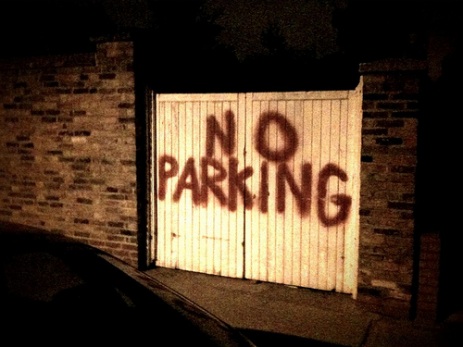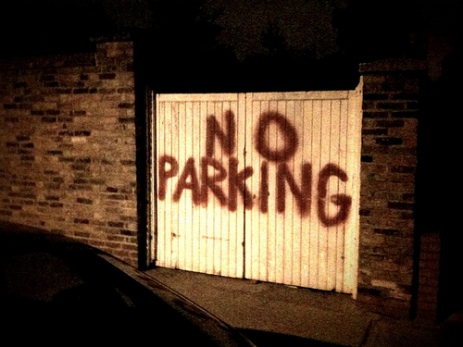 Photo: James Bridle
Photo: James Bridle
The U.S. has as many as eight parking spaces per car. That’s more than a billion parking spaces, or one for every person in China, should they need them once they’re done buying all our post-crash assets for jiǎos on the yuán. This isn’t just overkill — it’s stupid, destructive, expensive overkill.
1. Parking spaces are bad for the environment at least three different ways, says PRI.
“A recent study found that parking spaces may be just as environmentally harmful as the cars that fill them. […]
It takes a lot of energy to create a parking space, including the creation and transportation of asphalt. The asphalt also traps heat, which artificially raises the temperature of cities. This, in turn, “puts an additional load on buildings to increase air conditioning,” says [Mikhail Chester, lead author of a study from UC Berkeley on parking spaces.] Water runoff due to paved surfaces has [been] shown to dramatically affect water environments near cities.
2. “Free” parking costs you money. Downtown, every parking space is that much less square footage of tax-paying building adding to the economic vitality of your local business district. This is one of the few issues where progressives and libertarians are on the same page, or should be, says Streetsblog.
3. Parking is the most voracious devourer of some of the most valuable land in a city, reports Inside Science News.
“[Parking] is the single biggest land use in any city,” says Donald Shoup, a UCLA urban planning professor who is the guru of parking reform. “It’s kind of like dark matter in the universe, we know it’s there, but we don’t have any idea how much there is.”
4. Free parking encourages bad behavior. Even bars are mandated to offer free parking, points out Jon Hiskes at Grist. Isn’t this an issue MADD should be all over?
5. Cities are missing out on huge revenues by not charging fair market rate for in-demand parking spaces. San Francisco has rolled out smart parking meters with “demand-responsive pricing” that ratchet up the price of a space as the supply dwindles, to as much as $6 an hour, reports Engadget. In other words, they’re finally catching up with your high school economics class.
6. Smart parking meters can reduce traffic by eliminating the need to circle the block. Notoriously parking-unfriendly Park Slope in Brooklyn — aka “no-Park Slope” — tried out smart parking meters with demand-sensitive pricing, and it increased turnover of spots, allowing more people to get in, get out and get their entitled stroller-pushing business done.
For more on the high cost of “free” parking, check out the classic New York Times and L.A. Times pieces on the subject.



